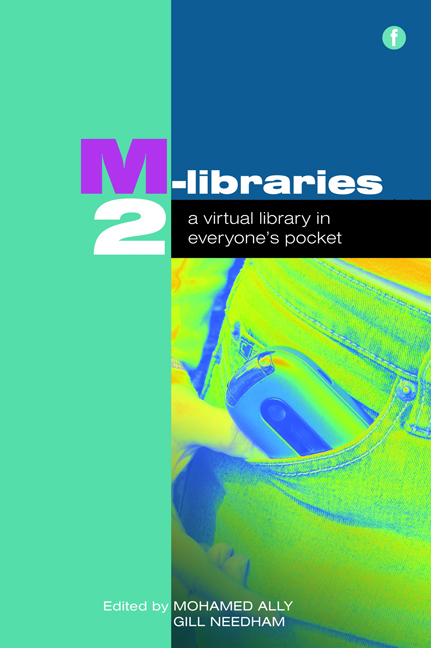Book contents
- Frontmatter
- Contents
- Acknowledgements
- Contributors
- Foreword
- Introduction
- PART 1 M-LIBRARIES: DEVELOPMENTS AROUND THE WORLD
- PART 2 TECHNOLOGY IN M-LIBRARIES
- PART 3 APPLICATION OF M-LIBRARIES
- PART 4 M-LIBRARIES AND LEARNING
- PART 5 BUILDING THE EVIDENCE BASE FOR M-LIBRARIES
- 24 Enhancing library access through the use of mobile technology: case study of information services provided by six mobile companies in Bangladesh
- 25 M-libraries: information use on the move
- 26 UCLA and Yale Science Libraries data on cyberlearning and reference services via mobile devices
- 27 Say what? An SMS transcript analysis at New York University
- Conclusion
- Index
25 - M-libraries: information use on the move
from PART 5 - BUILDING THE EVIDENCE BASE FOR M-LIBRARIES
Published online by Cambridge University Press: 08 June 2018
- Frontmatter
- Contents
- Acknowledgements
- Contributors
- Foreword
- Introduction
- PART 1 M-LIBRARIES: DEVELOPMENTS AROUND THE WORLD
- PART 2 TECHNOLOGY IN M-LIBRARIES
- PART 3 APPLICATION OF M-LIBRARIES
- PART 4 M-LIBRARIES AND LEARNING
- PART 5 BUILDING THE EVIDENCE BASE FOR M-LIBRARIES
- 24 Enhancing library access through the use of mobile technology: case study of information services provided by six mobile companies in Bangladesh
- 25 M-libraries: information use on the move
- 26 UCLA and Yale Science Libraries data on cyberlearning and reference services via mobile devices
- 27 Say what? An SMS transcript analysis at New York University
- Conclusion
- Index
Summary
Introduction
At the First International M-Libraries Conference in 2007 it was clear that many libraries were keen to explore the potential of mobile library services, but none of the delegates reported having asked library users what sort of library services they might want to access from mobile devices, or which mobile devices they were comfortable using. When I had the opportunity to take part in the Arcadia Programme at Cambridge University Library, I opted to investigate how library users access and interact with information when they are on the move. The key questions posed to students were ‘Do you use mobile devices?’ ‘What do you use them for?’ and ‘What would you want to access from the library?’
Method
I surveyed staff and students studying at both the Open University (OU), a distance learning institution, and Cambridge University, a collegiate institution. The survey focused on their use of information and, more specifically, on how they accessed information or used it on their mobile phones.
With only ten weeks in which to complete the research and approaching the end of term at Cambridge, I chose to use an online survey to gather data. The survey was promoted via mailing lists and library websites with the incentive of being entered in a prize draw. Only in the case of Open University students did the survey go to a selected sample of 2000 students, broadly representative of the student population. All other respondent groups were self-selecting.
Realizing that the provision of library services to mobile devices is a new area and that I didn't have any sample services to demonstrate to library users, I thought it likely that survey respondents would be confused or put off by questions relating specifically to provision of library services, and so I decided to focus instead on how they used their mobile phones to access and interact with information. Table 25.1 shows the total number of survey participants, and the response rates for the different user groups identified.
Results
Survey respondents were more positive about accessing information via text message than through the mobile internet. This can be attributed to both ease of use and the perceived costs of the two methods.
Over 60% of survey respondents had owned their current mobile phone for less than two years, which indicates that many of them had fairly up-to-date devices, with functionality including basic mobile internet browsing.
- Type
- Chapter
- Information
- M-Libraries 2A virtual library in everyone's pocket, pp. 235 - 244Publisher: FacetPrint publication year: 2010
- 2
- Cited by



